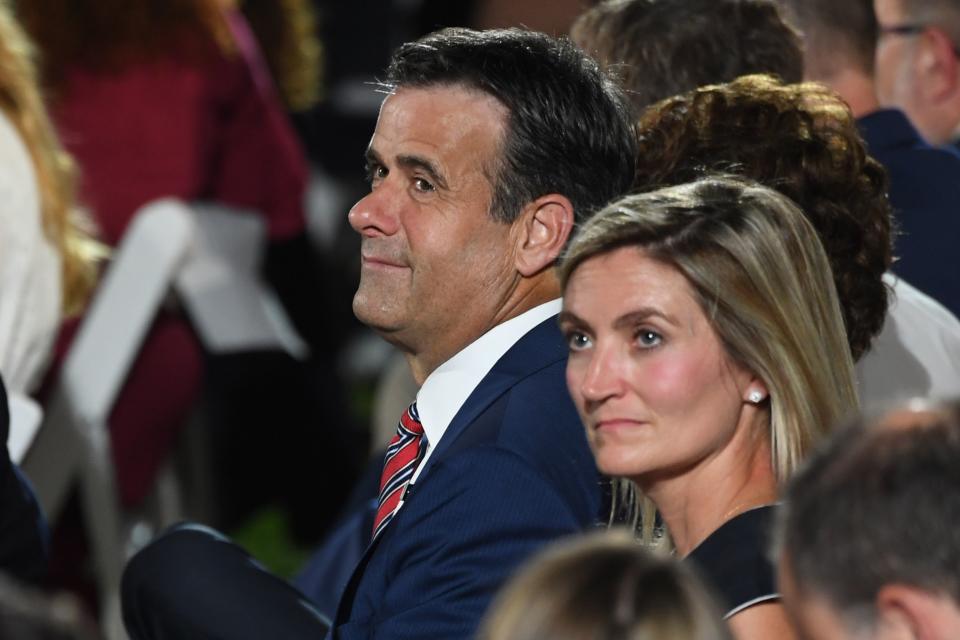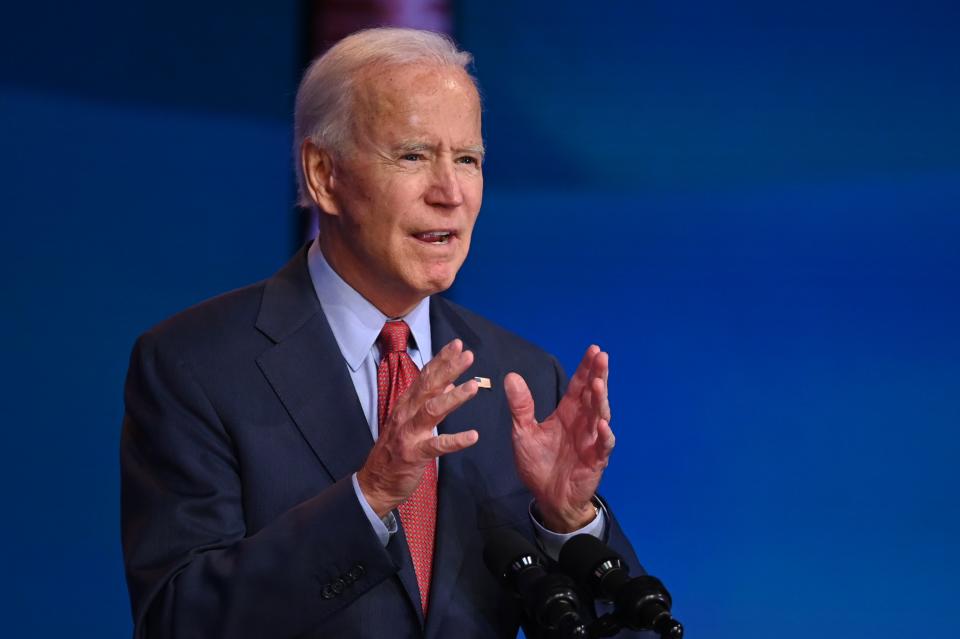Politics, COVID and attacks on civil service wearing on intelligence community as election approaches
WASHINGTON — A worsening pandemic and fears about losing their protections as civil servants amid ongoing political chaos is leading many intelligence officers in the U.S. government to consider leaving their agencies, according to more than 10 current and former intelligence officers who spoke to Yahoo News.
A combination of challenges is wearing hard on intelligence professionals these days, despite a tradition of avoiding even the most bitter partisan battles. While the intelligence community consists of 17 different agencies and thousands of employees, at least some are struggling in ways they’ve never previously experienced, according to those who spoke with Yahoo News.

Ongoing attempts made by President Trump and his director of national intelligence, John Ratcliffe, to politicize the intelligence community have made national headlines, but one of the largest concerns for rank-and-file intelligence officers is first and foremost their agency leadership’s handling of the pandemic — particularly as many of the intelligence agencies, including the Central Intelligence Agency, the Defense Intelligence Agency and the National Security Agency, are bringing nearly all their employees back to the office in shifts, amid rising coronavirus cases across the country.
In an unclassified message sent to the Defense Intelligence Agency workforce last week, the new DIA director, Lt. Gen. Scott Berrier, told employees that the agency would be moving to the next phase of returning to normal work, bringing all employees back into the building to work in two separate shifts. Berrier told his employees that the decision was not without risk, and that he would “own” that risk in the weeks ahead.
However, that was not reassuring to some employees, particularly those with families at home. For some, Berrier’s message was also not convincing that the change was necessary.
Increased flexibility and creating more opportunities for unclassified, open-source work was a priority of recently retired DIA Director Lt. Gen. Robert Ashley. Before leaving, Ashley put into place protections for employees working from home with families, but those will expire at the end of the year.
In office buildings with old HVAC systems and small cubicles separated by plexiglass, some intelligence officers are wondering whether the risk to their health and their family’s health is worth it. “I don’t feel protected at all,” said one intelligence officer.
While the intelligence community made major strides to adapt to the pandemic early in its progression, and some work is still going smoothly, including remote, classified teleconferencing, many intelligence officers are feeling that leadership is impatient with the restrictions in place and moving too quickly to get things back to normal.
“You’re going to have a mass exodus from the intelligence community,” said another intelligence officer.
The Office of the Director of National Intelligence, the CIA and the DIA did not immediately respond to requests for comment on the ongoing challenges facing their workforces.

Agency leadership is in a tough position, particularly at agencies like the CIA, where so much of the work is classified and must be done in secure spaces. In the early days of the pandemic, some employees felt the agency was too slow to respond and didn’t put out appropriate guidance, while others were concerned about the security risks of people trying to work from home.
Some employees had the overall impression that the CIA “really mishandled the virus,” and failed to accommodate employees whose family members might be immunocompromised, said one former CIA officer.
“Some of the messaging from the seventh floor played into the health misinformation to convince people things were safer than they were,” the officer said, referring to the top floor of the agency, where senior leadership is housed.
Another national security official agreed, saying the attitude at the CIA is that it is an organization “that takes risks for a living,” making senior officials unwilling to “wait another six months for a vaccine.”
However, one former senior intelligence officer who has spoken to officials making health-related decisions told Yahoo News that leadership faces tough choices.
“You’re trying to balance the well-being of the workforce with the notion that you can’t also have half the workforce at home twiddling their thumbs,” the former officer said. “That’s just unsustainable.”
“What they failed to anticipate and what they need to do for the future is to have this permanent workforce flexibility,” said Marc Polymeropoulos, a former senior CIA officer who retired in 2019.
“Multibillion-dollar international companies manage to do it, and they have sensitive proprietary information to protect,” he said. “This has got to be a huge place for reform and change in the intelligence community.”
However, according to Polymeropoulos, the major threat to losing senior intelligence officials right now is the threat from Trump’s ongoing politicization of the intelligence community.

Polymeropoulos said employees should be concerned with blatant attempts to misuse raw intelligence from the investigation into Russian meddling in 2016, as well as two recent executive orders issued by the president targeting protections for civil servants and banning discussion of diversity and inclusion.
While it’s currently unclear how the executive order on the civil service might actually affect intelligence officers, Trump’s message on diversity already has. According to four sources familiar with the matter, events, trainings and meetings focused on diversity and inclusion have been canceled across the intelligence community after Trump’s executive order in late September, leading to deep frustration among many officers.
According to Polymeropoulos, who managed operations officers responsible for recruiting spies around the world, “having a diverse cadre of officers” was one of his biggest strengths. “If I’m in the Middle East, do I want a 6-foot-2 white guy with tattoos and a buzzcut on the street? Probably not,” he said. “The idea of doing something that alienates significant portions of our workforce is crazy.”
“Having a diverse and inclusive workforce is a matter of national security,” said Cindy Otis, a former CIA analyst who has written about her personal experience as a CIA officer with a disability, about her work on diversity and inclusion and about ways agency leadership must improve. “Analysis quickly becomes biased when it is conducted by people with identical backgrounds,” she continued.
Other former senior intelligence officers felt that politics wouldn’t be the reason for any major loss of talent in the intelligence community. “We show up, do our jobs, recruit spies, steal secrets, do the analysis,” said former CIA officer Dan Hoffman.

“That political stuff will blow in the wind,” he said. “In my decades at the agency, things went up and down. People left during the Clinton years because there was a peace dividend, and the opposite of that was 9/11, when so many people came in.”
“Retirements tend to come at the end of the year regardless, due to the way the system is structured, maximizing annual leave payouts and such,” said Douglas London, a former senior CIA officer. “But morale could be better. [CIA Director Gina Haspel] hasn’t done the workforce any favors.”
London also said the hiring of Bert Mizusawa, a Trump campaign veteran at the CIA, “suggests a purge of ‘disloyalists’ should Trump win.” It’s not necessarily uncommon for administrations to find jobs for employees who otherwise might be out of work. However, London warned that someone like Mizusawa, who has “extraordinary access” to sensitive employee files, could be part of an “unprecedented” purge based on “officers’ political beliefs and perceived lack of personal loyalty and fealty to Trump.”
Regardless of whether politics will force an exodus from the top ranks of the intelligence community, the next president will likely make major changes to its leadership. Reportedly, Trump plans to fire several of his intelligence chiefs if he wins reelection, including Haspel and FBI Director Chris Wray.
And if former Vice President Joe Biden wins, it’s likely he will bring in his own team as well. Multiple sources familiar with the matter predicted that former acting CIA Director Michael Morrell or former Deputy Director Avril Haines might be chosen to lead the CIA, while Robert Cardillo, a former director of the National Geospatial-Intelligence Agency, or former national security adviser Tom Donilon, might be tasked with heading the Office of the Director of National Intelligence.

In the meantime, those inside the national security community will have to navigate the threats presented by the upcoming election and the possibility that there will not be a clear result on Nov. 3.
“It’s a very dangerous period,” said Polymeropoulos. “If Trump loses, what does he do that could further damage the intelligence community? Everybody’s worried about this interim period and the transition of power, but what about in the national security sphere, where we have adversaries watching us? It’s not a safe time for America.”
_____
Read more from Yahoo News:


